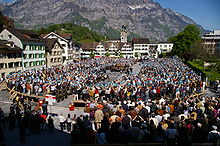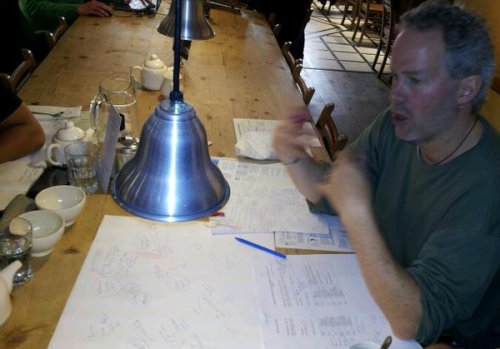
A Landsgemeinde (in 2009) of the Canton of Glarus, an example of direct democracy in Switzerland. CC BY-SA 3.0
I was asked this week by Harald Schendera, an editor, web designer, and internet marketer, what were my 10 Steps to Improve Our Governance Systems. He put the question out of personal interest and also to help me clarify what I’m trying to do in re-designing my various web presences.
I was intrigued. No one had ever asked that before. So I decided to write up an answer.
A quick web search turned up this piece – a very useful, if US-focused, list of 10 ways to democratize the economy by Gar Alperovitz and Keane Bhatt. I didn’t want to rip off their thought-provoking ideas, which include more use of participatory budgets, so I put it aside to draw up my own. The difference between the various search results I found and what I had in mind is that I’m trying to imagine a process that encompasses the local everywhere to the global, passing via nation statehood on the way.
The following is what I came up with. The order’s maybe a bit out of whack, but some of the essentials are there. Though the list will probably be a perpetual work in progress, it’s a start. What do you think?
1. To detail and make clear to as wide a possible public the problems of our current governance systems, prinicipally at nation-state level but also at higher and lower levels.
2. To promote a basic governance credo inspired by demokratia – from the original Greek notion of “demos” and “kratos” – the Greek words for “people” and “power” respectively.
“Democracy” would therefore mean something more like real power in the hands of a majority of the people living in any particular geographic area of government. “Representative democracy” – which drastically reduces the ambitions of Ancient Greece’s demokratia – has proved predictably liable to capture by narrow, self-interested parties.
3. To nurture, and join, independent media operations that understand the problems of our current governance systems and champion the cause of reform and root-and-branch innovation.
4. To encourage, and take part in, multiple experiments with governance mechanisms that go beyond representative democracy’s periodic elections, political parties and party candidates.
5. To document the experimentation processes, both for research purposes and to spread information about results, including the context of why they are happening, what they’re finding, how they might apply elsewhere.
6. To encourage people to learn about, engage with and become active in the scrutiny and holding to account of their local governance systems, the lowest level of government to which they are exposed.
7. To develop governance innovation toolkits, describing the range of possible governance innovations available and “how to” manuals of applying them locally, and making them free to use and share.
8. To encourage people to consider their own preconceived ideas about “democracy”, not just what it means and where it came from but also to consider just how “democratic” they are as individuals (a vote for me, but not my neighbour)
9. To encourage the use of, and to adopt oneself, inclusive language and thinking, the notion that any solution to the current problems in our governance systems must ultimately take a whole-planet approach. That approach would take into account not only every human on the planet, and future generations, but also all the animals, plants and the biosphere itself.
10. To be open to the respective religions, spiritual practices, or lack of the same, in all other people on the planet. At the same time, to be clear about the fundamental goals of mutual respect for, and non-violence towards, all other people. While violent self defence might be legitimate in certain circumstances, a well-functioning governance system would include mechanisms, and potentially societal penalties, to prevent its misuse.















